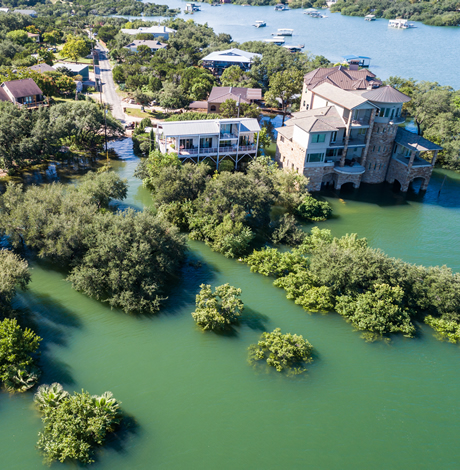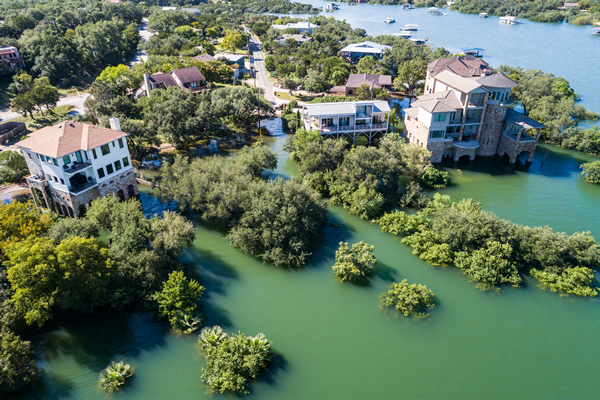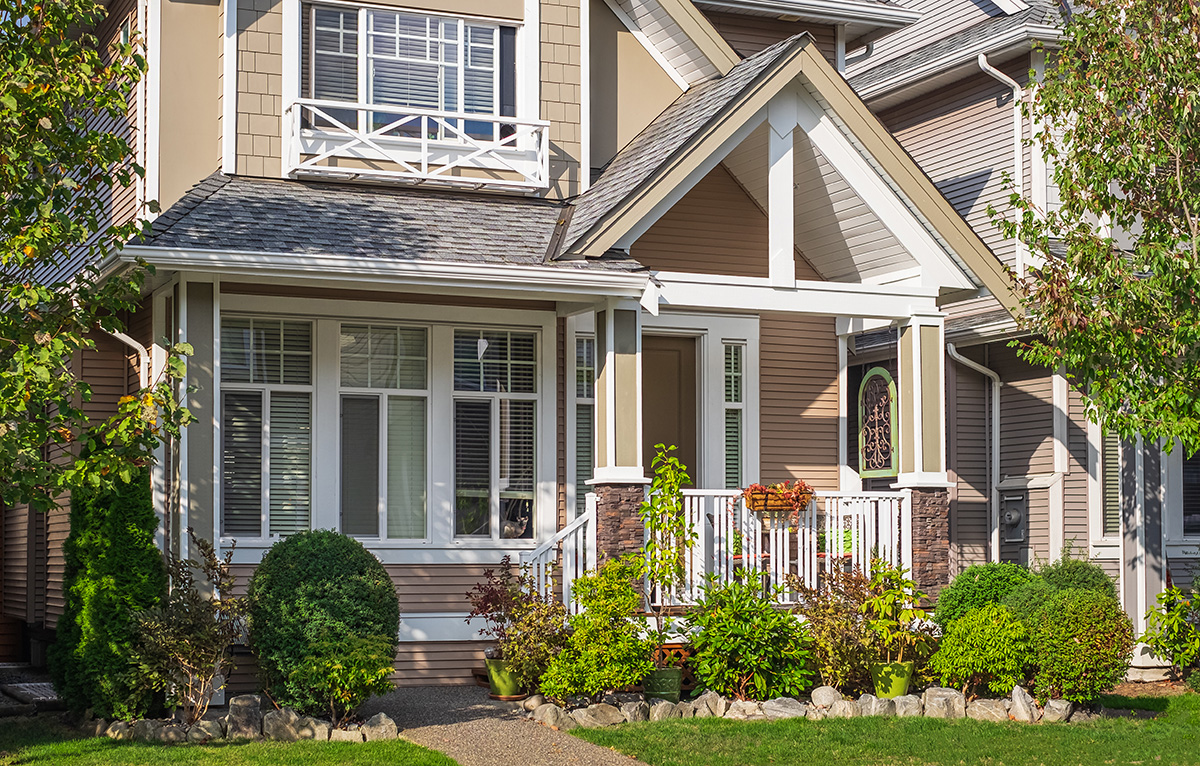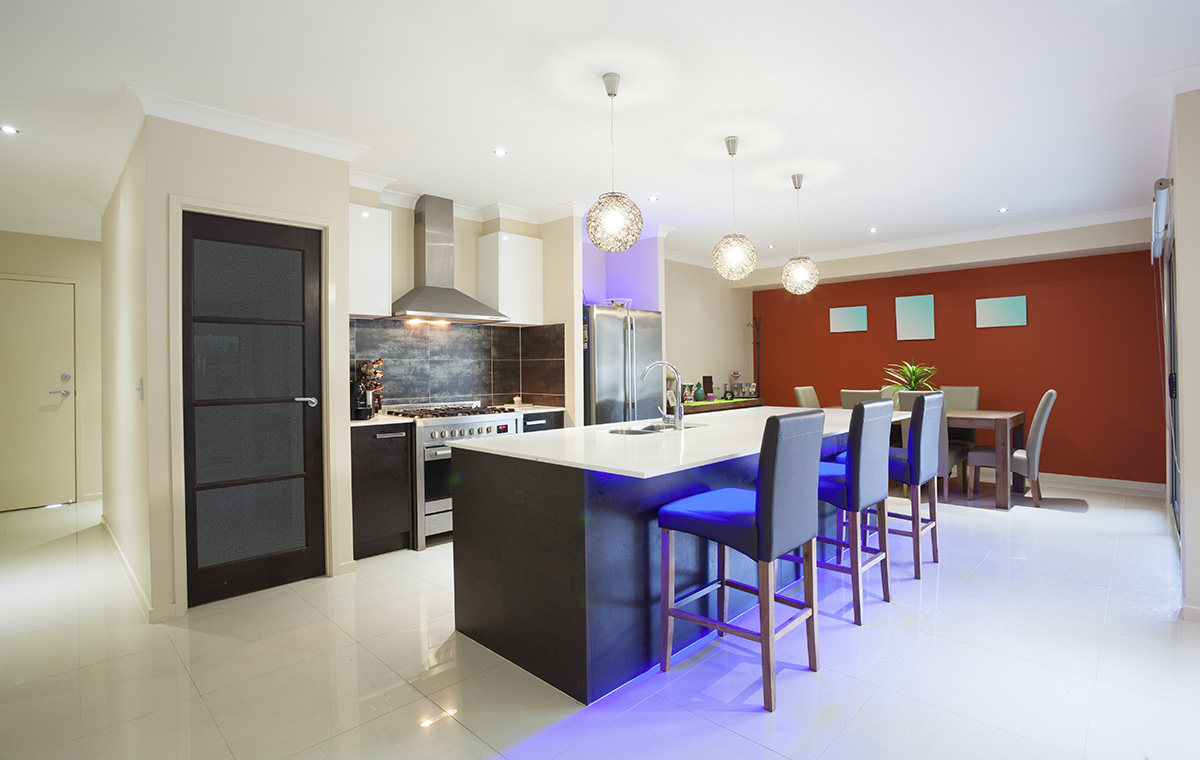Real Estate
Determining your insurance needs
Fire, flood, and pets are just some of the considerations


When you’re applying for a mortgage loan, you’re going to need homeowner’s insurance. Your lender will need the name and contact information of your insurance carrier before completing your loan.
Home insurance covers damage from weather and water, theft of belongings, vandalism, fire, and personal injury lawsuits. You can also add insurance for floods or earthquakes if applicable to your area, at additional cost. There is also insurance for specific items such as jewelry, art, and computers.
There are several companies we see frequently in the D.C. metropolitan area. One has a gecco for a spokesperson, another features J.K. Simmons, and a third introduces you at the local diner to a guy named Safe Drivers Save 40 percent. Don’t forget the idiot with the emu, the retired football player who claims to be on your side, and Jake who wears khakis.
Those who have a military connection can enroll in USAA and some credit unions also have insurance programs. There’s even a website called lemonade.com, which acts as a clearinghouse to shop your insurance with at least half a dozen companies.
The point is that you may choose your own insurer. Prices will vary depending on your deductible amount and the size, age and condition of the property, so get a couple of estimates just to be sure you’re getting value for your money.
Some people think that the Master Insurance policy in a condo or coop takes care of your insurance needs; it does not. If you’re buying a condo or a coop, you will need what’s called an HO-6 policy. This protects you, your contents, and things from the outer walls in. The same insurers should offer this type of policy.
Sadly, there are several types of dogs that some insurance companies won’t cover. Among them are Pit Bulls (also illegal to own in Prince Georges County), Great Danes, Alaskan Malamutes, German Shepherds, Akitas, Chow Chows, Siberian Huskies, Rottweilers, Doberman Pinschers, and the Perro de Presa Canario. Be sure to check with your insurer to see whether your dog might be excluded from coverage.
If you have a conventional loan with a down payment of less than 20%, Private Mortgage Insurance (PMI) will insure the lender for the difference from your down payment and 20% of the home’s value so that if you default on your payments, the lender is protected.
PMI costs will vary based on the amount of your down payment, your credit score, and the length of your loan, so be sure to check with your loan officer for the most up to date information. Once you pay down to 78% of the home’s value, the required payment ceases.
The Federal Housing Administration (FHA) also has a Mortgage Insurance Premium (MIP). It is similar to PMI in that it protects the lender and costs vary based on your loan. Since June 3, 2013, MIP can only be terminated if the mortgage is paid in full before the maturity date.
There is no mortgage insurance for Veteran’s Administration (VA) loans, but there is a funding fee that must be paid but can be added to the loan amount. There are exemptions from paying the funding fee, most having to do with disability or receipt of a Purple Heart from actions while on active duty.
Sometimes people get home insurance confused with home warranties. In general, home warranties cover heating, central air conditioning, plumbing, electricity, and appliances. Some offer roof coverage. With these, you contact your warranty provider, outline the problem, pay a service fee and, if the problem is covered by the warranty, a repair person is assigned to fix or replace the item.
Mortgage Protection Insurance (MPI) functions as a life insurance policy: you pay premiums to the insurance company to purchase a specific amount of mortgage protection coverage. Those premiums are based on your attained age and your health, as well as the value of your home and the payoff amount. A term life insurance policy may have more flexibility so check with a life insurance company before you buy to see what is best for you.
Finally, make sure you have a system for keeping track of your insured contents in case you need to make a claim. Our phones make it easy; simply make a panoramic video of everything in each room. Take pictures and keep receipts for expensive or one-of-a-kind items, then upload them to the cloud, where things never catch fire or flood. I’ve been there and it’s not pretty.
Valerie M. Blake is a licensed Associate Broker in D.C., Maryland, and Virginia and Director of Education & Mentorship at RLAH Real Estate. Call or text her at 202-246-8602, email her via DCHomeQuest.com, or follow her on Facebook at TheRealst8ofAffairs.
Real Estate
Spring updates to sell your home for pride and profit
Consider new landscaping, power washing, creative staging

Selling a home is a big deal for anyone, but for members of the LGBTQ+ community, it comes with unique considerations—from finding affirming professionals to ensuring your home is represented in a way that reflects your values. Whether you’re a first-time gay home seller or a seasoned LGBTQ+ homeowner looking to move up, maximizing your home’s value is key to a successful and empowering sale.
Here’s how to prepare your home, your mindset, and your real estate strategy to get the most value—financially and emotionally—from your home sale.
1. Start with an LGBTQ+-Friendly Real Estate Agent
Before diving into renovations or staging, make sure your agent truly understands your needs. A gay-friendly or LGBTQ+-affirming real estate agent brings more than just market expertise—they bring cultural competence, safety awareness, and a network that supports you throughout the selling process.
At GayRealEstate.com, you can find experienced, vetted LGBTQ+ real estate agents who have been proudly serving the community for over 30 years. Working with someone who shares or supports your identity ensures your selling journey is respectful, inclusive, and effective.
2. Enhance Curb Appeal—With a Welcoming Vibe
The outside of your home is the first impression a potential buyer gets. Make it count—especially for LGBTQ+ buyers looking for a home that feels safe and welcoming.
- Fresh landscaping: Add colorful flowers, neatly trimmed shrubs, or low-maintenance greenery to appeal to eco-conscious buyers.
- Update the entrance: A new front door, stylish lighting, or even a rainbow doormat can make your home feel like a safe space from the start.
- Clean and repair: Power wash the exterior, touch up paint, and make any necessary repairs to gutters, windows, or siding.
3. Stage with Intention and Inclusivity
Home staging can add thousands to your sale price. But beyond the usual decluttering and neutral palettes, think about how your space tells a story—and who it’s telling it to.
- Create a warm, inclusive feel: Subtle touches like LGBTQ+ art, books, or even coffee table magazines can show off your personality and affirm the space for queer buyers.
- Depersonalize—but don’t erase: You don’t need to hide your identity to appeal to buyers. Let your home feel lived in and loved—while still being a blank canvas others can imagine themselves in.
- Highlight multi-use areas: Home offices, gender-neutral nurseries, or flex spaces resonate with LGBTQ+ families and professionals.
4. Update Kitchens and Bathrooms Strategically
These rooms matter most to buyers—and even small updates can yield big returns.
- Kitchen: New cabinet hardware, a fresh backsplash, and modern lighting can elevate the entire room without a full remodel.
- Bathroom: Replace old fixtures, re-caulk tubs and sinks, and add plush towels and inclusive décor.
- Energy-efficient upgrades: Touchless faucets, smart appliances, or low-flow toilets are not only trendy—they signal sustainability, which matters to LGBTQ+ buyers.
5. Make Your Home More Energy Efficient
LGBTQ+ homebuyers often prioritize sustainability. These updates not only reduce energy bills but make your home more marketable.
- Install a smart thermostat (like Nest or Ecobee)
- Upgrade insulation or windows
- Consider solar panels (especially in sun-drenched regions like California or Florida)
Bonus: You may qualify for state or federal tax credits, which can be a great selling point.
6. Know and Advocate for LGBTQ+ Housing Rights
Although housing discrimination is illegal under the Fair Housing Act, it still happens. As an LGBTQ+ seller, be aware of your rights—and those of potential buyers.
- Avoid steering or bias: Even with good intentions, make sure you’re not inadvertently influencing who views or buys your home based on identity.
- Work with affirming professionals: From inspectors to lenders, choose partners who support inclusive practices.
- Report discrimination: If you or a buyer encounters bias, report it to HUD or your local housing authority.
7. Price Your Home Right—and Market It Smartly
Setting the right price is essential to maximizing value. Your LGBTQ+-friendly agent can run a comparative market analysis, considering current trends and buyer demographics.
- Leverage LGBTQ+ real estate networks: Promote your home through platforms like GayRealEstate.com to reach an audience that understands and values your space.
- Use inclusive language in listings: Avoid gendered terms or heteronormative assumptions. Instead of “his and hers closets,” use “dual walk-ins” or “double closets.”
- High-quality photos and video tours: Showcase your home with professional, visually inclusive marketing that appeals to diverse buyers.
8. Consider Timing and Local LGBTQ+ Trends
Selling during WorldPride or just before local LGBTQ+ events may boost visibility. Also consider if you’re in or near an LGBTQ+ friendly city or neighborhood.
Not sure which areas are top destinations? GayRelocation.com tracks and shares the best cities for LGBTQ+ homebuyers, helping you tap into motivated buyers.
Final Thought: Sell with Confidence—and Community
Selling your home isn’t just about getting top dollar—it’s about closing a chapter with pride and integrity. When you center your values, work with LGBTQ+ affirming experts, and prepare your home with purpose, you’re not just maximizing your home’s value—you’re creating an empowering experience for yourself and the next owner.
Whether you’re buying, selling, or both—GayRealEstate.com is your trusted partner in every step of your journey. With a nationwide network of gay and lesbian realtors, decades of experience, and deep community ties, we ensure your home transition is safe, smart, and full of pride.
GayRealEstate.com is the nation’s leading online platform connecting LGBTQ+ home buyers and sellers with LGBTQ+ friendly real estate agents, ensuring a safe and supportive experience.
Scott Helms is president of GayRealEstate.com. To find an agent or learn more, visit GayRealEstate.com, GayRelocation.com or call 1-888-420-MOVE.
Real Estate
Navigating DMV real estate market during political unrest
Reductions in federal employment have introduced uncertainties

The Washington, D.C.-Maryland-Virginia (DMV) region has long been recognized for its robust housing market, underpinned by the presence of the federal government and a diverse economic landscape. Recent massive reductions in federal employment have introduced uncertainties, yet the area continues to offer compelling reasons for prospective homebuyers, particularly within diverse communities.
While the federal government has traditionally been a significant employer in the DMV, the region has proactively diversified its economic base. Sectors such as technology, professional services, education, and healthcare have expanded, mitigating the impact of federal job cuts. This diversification fosters some economic resilience, which offers our area a semblance of protection against the impending unknowns that we currently face. Nothing can shield real estate entirely; however, our area tends to survive these types of changes better than other parts of the country.
Despite concerns over federal layoffs, the DMV housing market has demonstrated notable stability. Analyses indicate that the number of active listings, sold properties, and median sales prices have remained steady on a year-over-year basis. This steadiness suggests that the market is adapting to changes without significant disruption.
Furthermore, while there has been a slight increase in home listings, this trend aligns with typical seasonal variations and does not solely reflect federal employment changes. The luxury property segment, in particular, continues to thrive, indicating sustained interest and investment in the region.
The DMV region is renowned for its cultural and demographic diversity, with areas like Montgomery County, Md., being among the most ethnically diverse in the nation. This inclusivity extends to various communities, including LGBTQ individuals, fostering a welcoming environment that enhances the area’s appeal. Even though the current administration is fostering anti-diversity ideology, I remain confident that our LGBTQ community will continue to thrive even as these destructive forces work against us.
Local governments within the DMV have implemented policies aimed at promoting affordable housing and preventing displacement, particularly in the wake of economic shifts. Initiatives like the Douglass Community Land Trust in Washington, D.C., exemplify efforts to maintain housing affordability and support community stability.
Additionally, jurisdictions such as Montgomery County have longstanding Moderately Priced Dwelling Unit (MPDU) programs that require developers to include affordable housing in new residential developments. These policies contribute to socioeconomically mixed neighborhoods, benefiting diverse populations.
Despite Elon Musk’s brandishing of a chainsaw to the federal workforce, our real estate market continues to thrive. The DMV region maintains its appeal. Economic diversification, market stability, commitment to diversity and inclusion, and progressive housing policies collectively contribute to an environment that supports and attracts diverse communities. Prospective homebuyers can find reassurance in the region’s resilience and ongoing efforts to foster an inclusive and vibrant community. These are only a few among the many reasons to have a positive outlook while considering real estate options in our area.
It is important to consider working with brokerages, brokers, agents, lenders and title companies who align with our community and our objectives. Not all LGBTQ agents work for brokerages that support or understand the needs of the members of our community. Do your research and find out who has donated money to what political causes. Now more than ever we must support members of our community to protect our way of life and our very existence.
Stacey Williams-Zeiger is president/principal broker of Zeiger Realty Inc. Reach her at [email protected].

Whether you are upgrading parts of your current home to prepare it for sale or enhancing the home you just purchased, kitchens and bathrooms are still at the top of the renovation list.
Kitchen renovations have always embraced a blend of functionality, personalization, and aesthetic appeal; however, homeowners are currently moving away from sterile, uniform designs, opting instead for spaces that reflect warmth, character, and individual style. Here are some of the most prominent trends shaping kitchen renovations this year.
Warm and Earthy Tones
The dominance of all-white kitchens is waning as homeowners gravitate toward warmer, earth-toned palettes. Shades like sage green, navy blue, and natural wood finishes are becoming popular choices for cabinetry, infusing kitchens with a cozy and inviting atmosphere. This shift reflects a desire for spaces that feel more personalized and less clinical. Flat panel and Shaker cabinets continue to be popular options.
Integration of Organic Modernism
The “modern organic” style is gaining traction, characterized by using natural materials, neutral color palettes, and serene layouts. Incorporating elements like soapstone countertops, Venetian plaster walls, slate floors, and greenery not only enhances aesthetic appeal but can also increase home values significantly. Fully outfitted outdoor kitchens further contribute to this trend.
Innovative Kitchen Island Designs
Kitchen islands continue to be central features, with designs evolving to incorporate textures, wood and tile cladding, multifunctional elements, and bold colors and materials. Integrated seating areas, waterfall countertops, and the use of monolithic stone or stacked marble are becoming increasingly popular. These islands not only serve as functional workspaces but also as striking focal points within the kitchen.
Concealed Kitchens for a Sleek Look
The concept of concealed kitchens is on the rise, emphasizing built-in appliances, flush cabinetry, and appliance garages to maintain a clutter-free environment. This design approach fosters a minimalist aesthetic, creating a seamless flow between the kitchen and adjacent living areas, particularly in open-concept homes.
Personalized Cabinetry and Storage Solutions
Customization is key in modern kitchen designs, with homeowners seeking tailored storage solutions that cater to their specific needs. Features like hidden storage compartments, integrated lighting, and unique hardware choices are being favored over generic, cookie-cutter options. This trend underscores a move toward kitchens that are both functional and reflective of personal style.
Revival of Traditional Styles with Modern Twists
Traditional kitchen styles are making a comeback, with a contemporary twist. Elements such as expanded backsplash coverage, classic tile shapes and patterns, use of mixed metals, and specialty appliances are being integrated into modern kitchens, blending the charm of the past with the conveniences of the present. Custom range hoods, coffee bars and microwave drawers are increasingly added to renovation projects. This fusion creates spaces that are both timeless and equipped for modern living.
Sustainable and Natural Materials
Sustainability remains a priority, with an increased use of eco-friendly materials like reclaimed wood, recycled metals and glass, and energy-efficient appliances. This not only reduces environmental impact but also introduces unique texture and shimmer into kitchen designs, adding depth and character to the space.
Use of Bold Colors and Accents
Homeowners are becoming more adventurous with color and texture, incorporating vibrant hues and tactile materials into their kitchen designs. Features like colorful window trims, two-tone cabinets, and the use of wallpaper and feature walls add visual interest and a personalized touch to the space. In addition to the familiar white, major appliances are now shown in matte black, navy, and jewel tones of red, green, and blue. There are even vinyl wraps and magnet covers that allow for more creativity and individualization with appliances.
Integration of Smart Technology
The incorporation of smart technology continues to grow, with appliances featuring automated cooking functions, sensor reheating, and control locks becoming more prevalent. Induction stoves are entering the mix. Charging stations and touch-activated cabinet doors and faucets are also popular. LED lighting lasts longer and prevents you from having to climb a ladder to change lightbulbs on a high or vaulted ceiling. These advancements enhance convenience and efficiency, aligning with the modern homeowner’s desire for a kitchen that supports a tech-savvy and busy lifestyle.
Multifunctional Spaces
Kitchens are increasingly being designed as multifunctional spaces that accommodate cooking, dining, working, and socializing. This has led to the inclusion of features like integrated seating, versatile lighting, and adaptable layouts that can easily transition between different uses, reflecting the evolving role of the kitchen in contemporary homes. Still, don’t be surprised to see a resurgence of self-contained kitchens with real walls.
So, whether the kitchen you want is sleek and modern, earthy and organic, or traditional and elegant, there will always be fresh new styles, ideas, innovations and classic touches that cater to your lifestyle.
Valerie M. Blake is a licensed Associate Broker in D.C., Maryland, and Virginia with RLAH @properties. Call or text her at 202-246-8602, email her via DCHomeQuest.com, or follow her on Facebook at TheRealst8ofAffairs.
-

 State Department4 days ago
State Department4 days agoHIV/AIDS activists protest at State Department, demand full PEPFAR funding restoration
-

 Brazil4 days ago
Brazil4 days agoUS lists transgender Brazilian congresswoman’s gender as ‘male’ on visa
-

 District of Columbia4 days ago
District of Columbia4 days agoCapital Pride wins $900,000 D.C. grant to support WorldPride
-

 Mexico3 days ago
Mexico3 days agoGay couple claims Puerto Vallarta wedding venue discriminated against them












